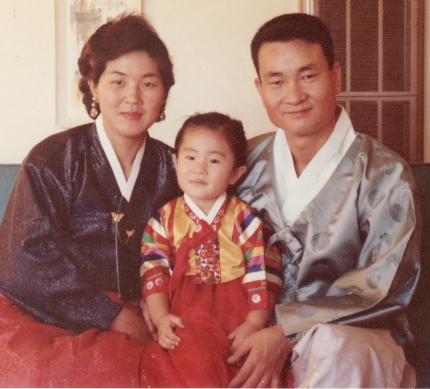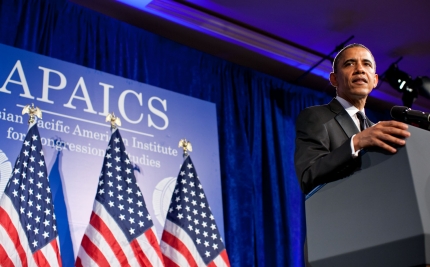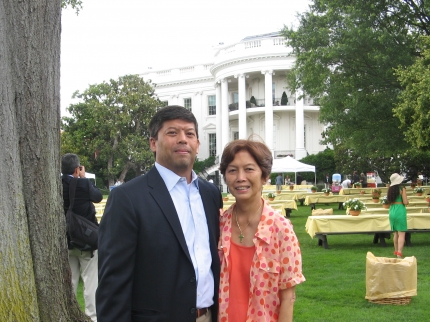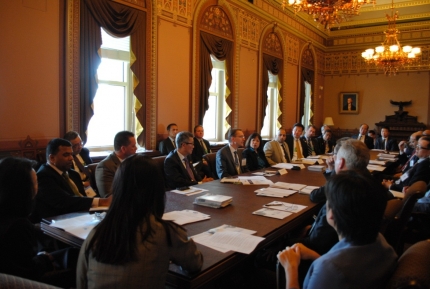Initiative on Asian Americans and Pacific Islanders Blog
Watch Live: Upcoming AAPI Heritage Month Events
Posted by on May 8, 2013 at 10:23 AM ESTWhite House Forum on AAPI Heritage (May 9)
On Thursday, May 9, the U.S. Department of the Interior, White House Office of Public Engagement, and White House Initiative on AAPIs will host a forum on Asian American and Pacific Islander (AAPI) Heritage. National leaders and scholars will discuss how the legacy of Asian Americans, Native Hawaiians, and Pacific Islanders should be recognized, preserved, and interpreted for future generations. The event will feature remarks by Interior Secretary Sally Jewell and senior Obama administration officials, as well as panel discussions featuring nationally recognized AAPI scholars and historians. Learn more about the National Park Service’s AAPI Theme Study.
To watch this event live, visit www.doi.gov/live on Thursday from 1:00 to 5:00 p.m. EDT.
White House Briefing on Suicide Prevention and Mental Health (May 10)
And on Friday, May 10, the White House Office of Public Engagement and White House Initiative on Asian Americans and Pacific Islanders (AAPIs) will host a briefing on Suicide Prevention and Mental Health, in conjunction with AAPI Heritage Month and National Mental Health Awareness Month. Panelists will share personal testimonies about their experiences dealing with suicide and mental health within the AAPI community, and discuss what resources are available to address both issues.
To watch this event live, visit www.whitehouse.gov/live on Friday from 9:00 to 10:30 a.m. EDT.
Learn more aboutOur Family’s Journey
Posted by on May 2, 2013 at 9:02 AM ESTNearly everyone in America has an immigration story to share. Our voices are louder when we speak together, so please share your stories and highlight the work that’s being done in your communities. Together we can achieve commonsense immigration reform.
I arrived in Chicago in the early 1960s as a two year old. My father was already in the United States on a scholarship from the Korean government for graduate work at the University of Illinois Urbana-Champaign in nuclear engineering. After he completed his Masters degree, my mother and I came to the U.S. in order to be with him while he completed his Ph.D. When I arrived in Chicago from Korea, it had been a long time since I had seen my father, and it was a difficult reunion. I did not recognize him or understand who he was. I would not let him pick up our luggage and was upset that he was holding hands with my mother. Fortunately, that did not last long. I soon was inseparable and would not let him leave my sight. He had to take me with him to his office because I would not let him leave without me.
We had planned to return to Korea after my father completed his Ph.D., but friends and relatives advised us otherwise. The Vietnam War was raging and they were concerned about problems the war might cause for Korea. And so we all remained in the U.S. and became naturalized citizens. We lived in Colorado at the time and were one of very few Asian American families there. I often was the first and only Asian American many of my classmates and neighbors had ever met. My mother grew cabbage, bean sprouts and chili peppers in our backyard because there were no Asian grocery stores from which to buy the ingredients for KimChee. Over time, my father sponsored some of his siblings to immigrate to the U.S. It was wonderful to suddenly have aunts, uncles and cousins. I had never known what it meant to have relatives before, so I didn’t know what I missed until I had it. I can only imagine how lonely it must have been for my parents to be alone in the U.S., missing their family for so many years.
Our family now has several generations in the U.S. and we are in communities across the U.S. Many of us are still in Colorado; I am in Chicago; others of us are settled on the coasts. My father went on to a long career in the U.S. Navy and the Department of Energy. At the end of his career, during the Clinton administration, he became a technical advisor to the U.S. State Department to negotiate with North Korea to shut down their nuclear program in exchange for new and safer nuclear technology from the U.S. and international allies. It was a fitting close to his career in public service and his decision to immigrate to the U.S.—to be able to represent his adopted country in work that also would assist the land of his birth.
Ms. Unmi Song is a member of the President’s Advisory Commission on Asian Americans and Pacific Islanders. Song is also Executive Director of the Lloyd A. Fry Foundation.
Learn more about ImmigrationKicking Off AAPI Heritage Month 2013
Posted by on May 1, 2013 at 9:13 AM ESTToday marks the first day of this year’s Asian American and Pacific Islander (AAPI) Heritage Month. To mark the occasion, President Obama issued a Presidential Proclamation. In it, the President highlighted the importance of using this month to reflect upon the history and contributions of AAPIs to this country:
“Each May, our Nation comes together to recount the ways Asian Americans and Pacific Islanders (AAPIs) helped forge our country. We remember a time 170 years ago, when Japanese immigrants first set foot on American shores and opened a path for millions more. We remember 1869, when Chinese workers laid the final ties of the transcontinental railroad after years of backbreaking labor. And we remember Asian Americans and Pacific Islanders who have made our country bigger and brighter again and again, from Native Hawaiians to the generations of striving immigrants who shaped our history -- reaching and sweating and scraping to give their children something more. Their story is the American story, and this month, we honor them all.”
This year, the White House Initiative on Asian Americans and Pacific Islanders and the Smithsonian Asian Pacific American Center selected a Heritage Month theme, “I Want the Wide American Earth,” based on the poem by acclaimed Filipino American writer, Carlos Bulosan. As Bulosan so eloquently writes:
Before the brave, before the proud builders and workers,
I say I want the wide American earth
For all the free.
I want the wide American earth for my people.
I want my beautiful land.
I want it with my rippling strength and tenderness
Of love and light and truth
For all the free.
Bulosan’s poem captures the scope and ambition of the American Dream. His words also reflect the enduring spirit of many AAPI immigrants and refugees seeking freedom and prosperity for their families.
Over the next month, we will highlight the many ways in which the Obama Administration continues to address the needs of the AAPI community, for example by working towards commonsense immigration reform. We encourage you to share your own stories and the work that’s being done in your communities.
Throughout the month, we will also host a number of exciting events, including:
Google+ Hangout for AAPI Heritage Month
Today, from 3:00 – 3:45PM EST, Lisa Ling, Phil Yu (the blogger behind Angry Asian Man), and representatives from the White House Initiative on AAPIs and the Smithsonian Asian Pacific American Center will help launch AAPI Heritage Month through a Google+ Hangout (webcast discussion).
- To watch this event live, click here.
- To Tweet a question, use #may1apa.
White House AAPI Women Champions of Change
On Monday, May 6th from 1:00 – 3:30PM EST, the White House will honor fifteen AAPI women as “Champions of Change,” recognizing their extraordinary work to create a more equal, safe, and prosperous future for their communities and the country.
- To watch this event live, visit www.whitehouse.gov/live at 1:00PM EST.
- To learn more about the White House Champions of Change program, visit www.whitehouse.gov/champions.
White House Forum on AAPI Heritage
On Thursday, May 9th from 1:00 – 5:00PM EST, national leaders and scholars will gather to discuss how the legacy of Asian Americans, Native Hawaiians, and Pacific Islanders should be recognized, preserved, and interpreted for future generations. The event will feature remarks by senior Obama Administration officials and panel discussions featuring nationally recognized AAPI scholars and historians.
- To watch this event live, visit www.doi.gov/live at 1:00PM EST.
- For more information, please click here.
AAPI Heritage Month is an annual call to action for the AAPI community. We would like to hear about your plans to observe AAPI Heritage Month and your vision of the “Wide American Earth,” and encourage you to fill out this feedback form. Together, we look forward to celebrating the contributions of the AAPI community in the month ahead, and we hope you will visit www.whitehouse.gov/aapi to learn more.
Kiran Ahuja is the Executive Director of the White House Initiative on Asian Americans and Pacific Islanders.
Gautam Raghavan is an Associate Director in the White House Office of Public Engagement.
Finding Home
Posted by on April 24, 2013 at 2:19 PM ESTNearly everyone in America has an immigration story to share. Our voices are louder when we speak together, so please share your stories and highlight the work that’s being done in your communities. Together we can achieve commonsense immigration reform.
I speak a lot about a cross-country trek I took a few years ago during a job transition. For me, driving from the New York City metro area to San Francisco was not only a unique opportunity to see America, but also a pilgrimage to learn more about my own story as the son of immigrant parents.
I set out for Great Falls, Montana. Why Great Falls? Because in 1964 a young woman came alone from the Philippines to work as a nurse at Great Falls Deaconess Hospital.
This woman was not unlike many others from the Philippines and other countries that have a long legacy of nurses coming to America. But this woman is my mother, and like most immigrants to this country, she came here pursuing a dream to improve her life and her family’s.
As a child, I remember seeing photos of my mother in the snow and in front of the state capitol in Helena, Montana. I wondered why she would endure such a vast difference in weather and, of course, culture. Luckily for her, she and the other nurses from the Philippines involved in the program in Great Falls created a small community for themselves, living together in a house where they could share meals and their new experiences.
She later moved to Chicago, Illinois, where she met my father, and our growing family moved to Atlanta, Georgia and then Homestead, Florida. All the while, she continued her career caring for others who were sick and in need, and raising four children.
In 1986, my mom became a nurse at the Miami VA Medical Center, caring for veterans and directly giving back to the country that had not only become her home but also where she had become a citizen. She was honored for her service at the VA just a few years later with the VA Hands and Hearts Award given to “the employee involved in direct patient care who does the most to exercise professional expertise, to provide emotional support, help and guidance to patients.”
At 71, her career as a VA nurse is still going strong, although retirement and spending more time with her own mother and granddaughter is in her near future. Her friends and colleagues at the VA, many of them representing a new wave of immigrants, threw her a party last month to help her celebrate her 50th year as a nurse.
I think often of my trip to Great Falls where I saw the places my mom first worked and lived in the United States—the hospital that’s now an assisted living facility and the house just down the street where she and other Filipina nurses lived.
Asian Americans and Pacific Islanders (AAPIs) have much at stake when it comes to commonsense immigration reform. Three-quarters of our community members are foreign-born and AAPIs naturalize at the highest rates of those who choose to become American citizens. My mom’s story is not unique. Her story shares the characteristics of so many immigrants who have come here looking for opportunity and in the process have given back so much. These are stories of hard work, love of family, building community and finding home.
Hector Leonard Perez Vargas Jr. is a member of the President’s Advisory Commission on Asian Americans and Pacific Islanders. He is also Executive Director of the Gay & Lesbian Medical Association (GLMA).
Learn more about ImmigrationAAPI Businesses Drive Economic Growth
Posted by on April 12, 2013 at 1:58 PM ESTOn Tuesday, April 9th, the Export-Import Bank, the White House Office of Public Engagement, and the White House Initiative on Asian Americans and Pacific Islanders hosted a Roundtable on Expanding Trade Finance to the AAPI community. The roundtable was an opportunity for executives of AAPI-serving community banks from across the U.S. to engage with senior Administration officials about increased understanding and awareness of federal programs. For instance, participants discussed various products which support AAPI businesses including guarantees for loans supporting exports and U.S. projects overseas.
In the past decade, the Census Bureau estimated that AAPI-owned businesses generated approximately $508.6 billion in economic output. At the roundtable discussion, the Initiative emphasized the importance of supporting these businesses, many of which leverage strong ties in Asia in order to promote growth in America. Administration officials also highlighted the current U.S. rebalancing effort across the Asia-Pacific region and the Trans-Pacific Partnership (TPP), as the effort will hopefully result in stronger economic opportunities for AAPI-owned businesses.
Tuesday’s roundtable highlights community banks’ and AAPI-owned businesses’ role in building a 21st century economy.
Adil Kabani is the Economic Policy Advisor with the White House Initiative on Asian Americans and Pacific Islanders
Working with Higher Education Institutions Serving Asian American and Pacific Islanders
Posted by on March 28, 2013 at 5:58 PM ESTIn his State of the Union address earlier this year, President Obama outlined the Administration’s plan to strengthen the middle class by equipping every American with the skills to secure the jobs of a new economy. To grow our middle class, our citizens must have access to the education and training that today’s jobs require.
At the White House Initiative on Asian Americans and Pacific Islanders (WHIAAPI), this means investing in educational opportunities that provide the fastest growing racial group – Asian Americans and Pacific Islanders (AAPIs) – with the chance to access and to succeed in post-secondary education.
Through Asian American and Native American Pacific Islander Serving Institutions (AANAPISIs), our community can achieve these goals. AANAPISIs provide culturally sensitive and relevant curricula, environments that encourage students to develop a sense of identity and self-worth, and invest in students with need.
On March 27, 2013, AANAPISIs from across the country gathered in Washington D.C. for the Higher Education Programs Project Directors Meeting. This gathering provided the opportunity to brief program directors about WHIAAPI’s educational priorities, including plans to increase federal investments to AANAPISIs by providing greater access to resources like grant opportunities; funds to increase staff, faculty, and programming resources; best practices; and federal internships for students.
The briefing also gave AANAPISIs the chance to share their ideas with WHIAAPI. Several schools noted they are 2-year institutions that award associate degrees and other professional and technical certifications. The challenge, they added, lies not in securing a large research grant designed for a 4-year institution, but finding resources to support English language learners or adult vocational education.
The briefing also included a presentation by Fatima Pashei, Program Analyst in the Office of Economic Impact and Diversity at the Department of Energy. Fatima spoke about some of the unique resources at the Department that support AANAPISIs. She shared information about federal grants awarded to AANAPISIs and encouraged the schools to think creatively about finding similar opportunities amid scarce resources.
We look forward to continuing to work with AANAPISIs to better serve the educational needs of the AAPI community.
Phil Olaya is a Policy Advisor for the White House Initiative on Asian Americans and Pacific Islanders.
Learn more about
- &lsaquo previous
- …
- 30
- 31
- 32
- 33
- 34
- 35
- 36
- 37
- 38
- …
- next &rsaquo
White House Blogs
- The White House Blog
- Middle Class Task Force
- Council of Economic Advisers
- Council on Environmental Quality
- Council on Women and Girls
- Office of Intergovernmental Affairs
- Office of Management and Budget
- Office of Public Engagement
- Office of Science & Tech Policy
- Office of Urban Affairs
- Open Government
- Faith and Neighborhood Partnerships
- Social Innovation and Civic Participation
- US Trade Representative
- Office National Drug Control Policy
categories
- AIDS Policy
- Alaska
- Blueprint for an America Built to Last
- Budget
- Civil Rights
- Defense
- Disabilities
- Economy
- Education
- Energy and Environment
- Equal Pay
- Ethics
- Faith Based
- Fiscal Responsibility
- Foreign Policy
- Grab Bag
- Health Care
- Homeland Security
- Immigration
- Innovation Fellows
- Inside the White House
- Middle Class Security
- Open Government
- Poverty
- Rural
- Seniors and Social Security
- Service
- Social Innovation
- State of the Union
- Taxes
- Technology
- Urban Policy
- Veterans
- Violence Prevention
- White House Internships
- Women
- Working Families
- Additional Issues




